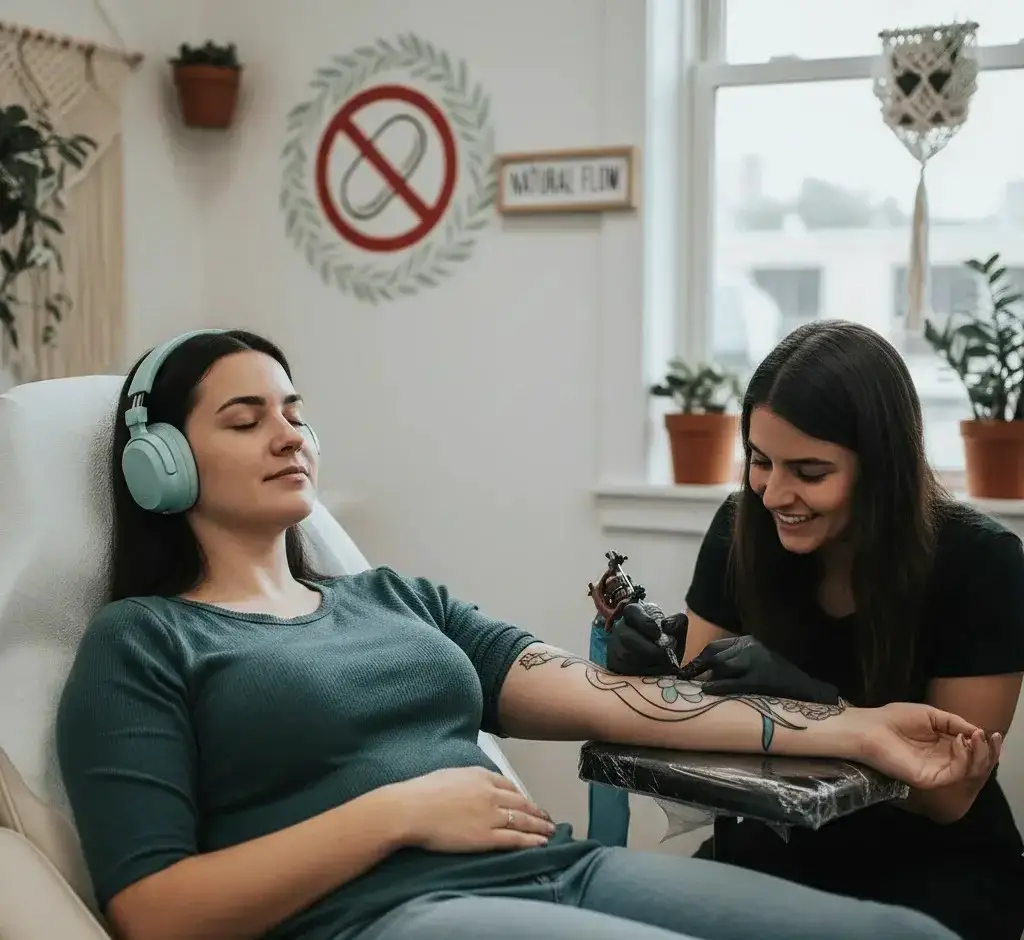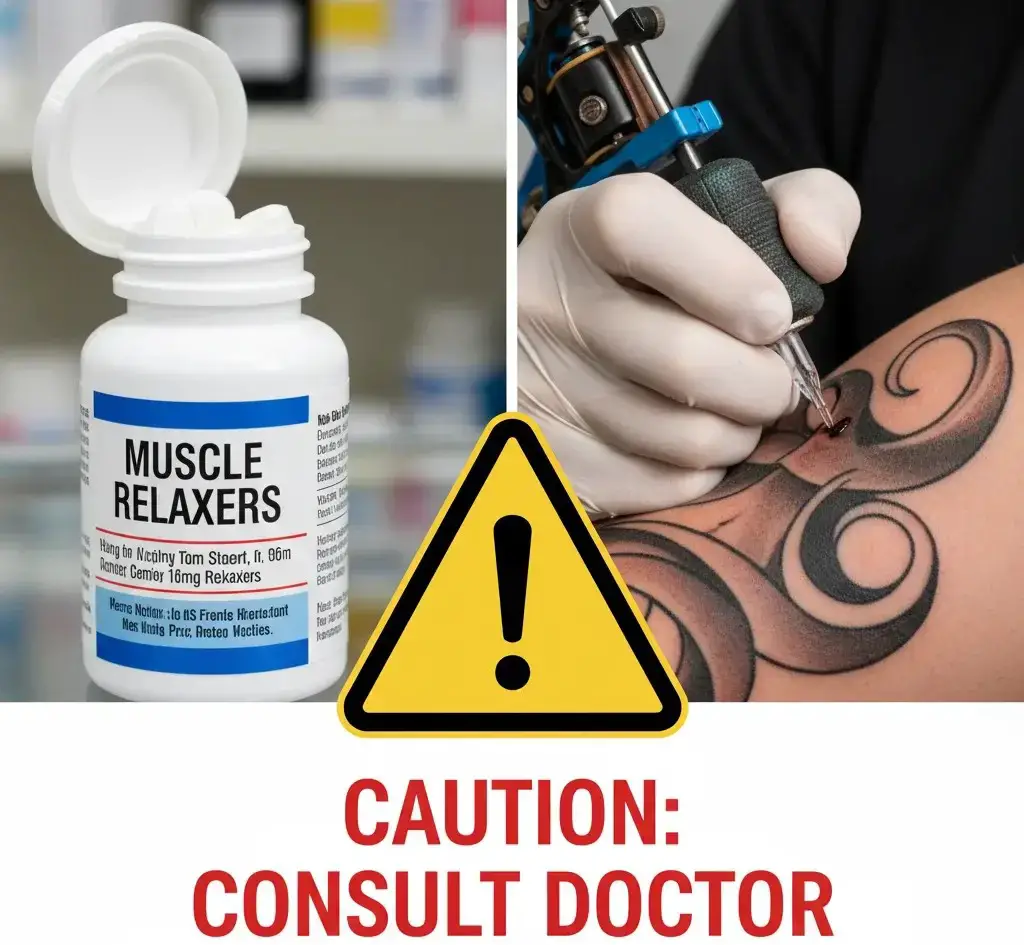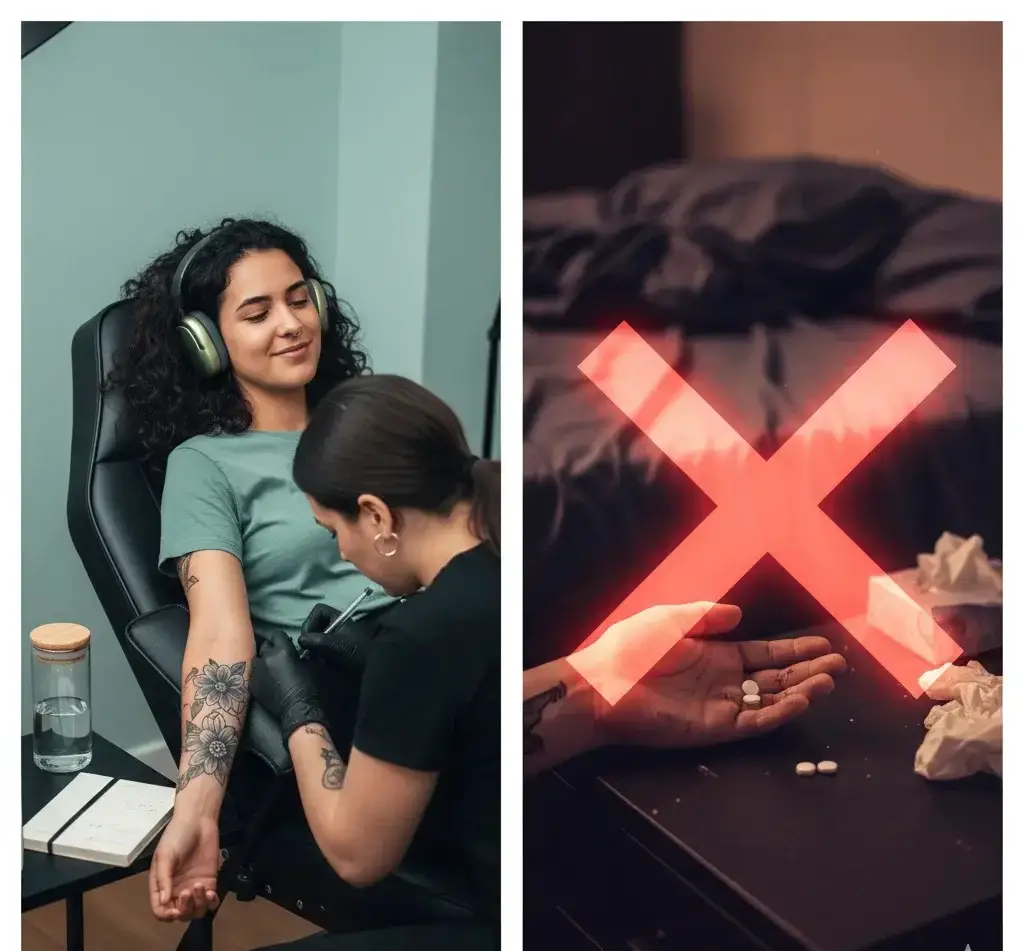Does the thought of sitting through hours of tattoo pain make you want to reach for a pill? You’re not alone—many people ask, “Can I Take A Muscle Relaxer Before Getting A Tattoo?” It sounds like an easy fix, but the truth is more complicated than it seems.
Tattoos involve skin pain, while muscle relaxers are designed for muscle problems, and that difference really matters.
Before you pop a prescription pill to get through your appointment, it’s important to understand how these drugs work and what risks they carry.
A muscle relaxer may not actually reduce tattoo pain the way you think, and in some cases, it could make the experience harder. Let’s break down what you really need to know.
Can I Take A Muscle Relaxer Before Getting A Tattoo?
Many people wonder if taking a muscle relaxer can make their tattoo session easier. While it may sound like a quick fix to reduce pain and tension, the answer is not straightforward.
Muscle relaxers are prescription medications that affect your nervous system, and using them before a tattoo comes with risks.
It’s always best to talk with a doctor before considering any medication for pain relief during tattooing.
What Are Muscle Relaxers And How Do They Work?
Muscle relaxers are medicines prescribed to treat muscle spasms, stiffness, and pain. They work by calming the nerves or blocking pain signals between the brain and muscles.
While they can reduce discomfort from injuries, they are not designed for tattoo pain. Since tattoos involve skin trauma, not muscle pain, these drugs may not provide the relief people expect.
Why Do People Consider Taking Muscle Relaxers Before Tattoos?
The idea of sitting through hours of needlework can make anyone nervous. Some people think muscle relaxers will make them calmer or prevent muscle twitching.
Others hope the drug will make the pain more tolerable. However, the reality is that tattoo pain is mostly skin-level pain, and muscle relaxers target a different type of discomfort.
Is It Safe To Take A Muscle Relaxer Before Tattooing?
Generally, it’s not considered safe to take a muscle relaxer before a tattoo unless your doctor approves it.
These medications can cause drowsiness, dizziness, and slow reflexes, which may not be ideal in a tattoo session.
Safety depends on your health condition, the type of relaxer, and any other medications you’re taking.

Can Muscle Relaxers Reduce Tattoo Pain?
Unfortunately, muscle relaxers are not very effective for tattoo pain. They work on muscles, not skin sensitivity.
The tattoo needle repeatedly penetrates the skin, and this discomfort isn’t reduced much by muscle relaxers. A numbing cream or breaks during the session are usually more helpful.
Do Tattoo Artists Recommend Muscle Relaxers?
Most professional tattoo artists do not recommend muscle relaxers. They may worry that the medication could make you lightheaded or too drowsy.
Also, tattoo artists want clients to be alert enough to give feedback if something feels wrong. Being under the influence of strong medication may also raise liability concerns.
Side Effects Of Taking Muscle Relaxers Before A Tattoo
Possible side effects include:
- Drowsiness and dizziness
- Difficulty staying alert
- Dry mouth or nausea
- Low blood pressure or slow reflexes
These effects can make the tattoo experience more stressful, not easier.
Can Muscle Relaxers Interfere With The Tattooing Process?
Yes, they can. If you become too sleepy or restless, it may be harder to sit still, which affects the artist’s work.
Some muscle relaxers may also thin your blood, leading to more bleeding during the tattoo, which can impact how well the ink settles in the skin.
Will Muscle Relaxers Affect Tattoo Healing?
There isn’t direct evidence that they affect healing, but anything that interferes with your body’s response can cause problems.
If a relaxer makes you bleed more or irritates your stomach so you can’t eat well, your healing may take longer.
A healthy immune system and proper aftercare are much more important for healing than taking a relaxer.
Can Muscle Relaxers Cause Excessive Bleeding During A Tattoo?
Some relaxers have mild blood-thinning effects, which may increase bleeding. Extra bleeding washes away ink, leading to faded lines or patchy colors.
It also forces the artist to wipe more often, making the session uncomfortable and longer.
What Happens If You Mix Muscle Relaxers With Painkillers Or Alcohol?
Mixing muscle relaxers with alcohol or painkillers can be dangerous. The combination may cause extreme drowsiness, slowed breathing, or even unconsciousness.
Since tattoos already stress your body, mixing drugs can put you at greater health risk.
Are There Alternatives To Muscle Relaxers For Tattoo Pain Relief?
Yes, safer options include:
- Using approved numbing creams
- Taking breaks during long sessions
- Practicing breathing or relaxation techniques
- Staying hydrated and eating before your appointment
These methods help without the risks that come with prescription drugs.
Can Numbing Creams Work Better Than Muscle Relaxers For Tattoos?
Yes, numbing creams are specifically made for surface-level pain, unlike muscle relaxers.
Many tattoo shops allow safe over-the-counter creams, which dull the skin’s nerve endings temporarily.
They don’t affect your muscles or brain, so they’re generally safer and more effective for tattoo pain.
Should You Talk To A Doctor Before Taking Muscle Relaxers For Tattoos?
Absolutely. Since these are prescription medications, only your doctor can confirm if it’s safe for you.
They’ll consider your medical history, other prescriptions, and potential side effects. Never take someone else’s prescription just to ease tattoo pain.

Can Muscle Relaxers Make You Too Drowsy For A Tattoo Appointment?
Yes, drowsiness is one of the most common side effects. This can make it harder to sit upright or follow the artist’s instructions.
Some clients even feel like they’re going to faint, which can delay the tattoo process and cause unnecessary stress.
How Long Do Muscle Relaxers Stay In Your System?
The effects of a muscle relaxer can last from 4 to 12 hours, depending on the type. Some may linger in your body for over a day.
If you have a long tattoo session, the drowsiness may last the entire time, making it uncomfortable and risky.
What To Do If You Accidentally Took A Muscle Relaxer Before A Tattoo?
If you already took one, be honest with your tattoo artist. Depending on how you feel, they may suggest rescheduling your appointment.
If you experience extreme dizziness or trouble staying awake, seek medical help. Your safety should always come first.
Are Muscle Relaxers Safe With Tattoo Aftercare Medications?
Aftercare usually includes ointments, moisturizers, or pain relievers like ibuprofen. Mixing these with muscle relaxers can sometimes be unsafe.
Always check with your doctor or pharmacist before combining medications during your tattoo healing process.
Tips For Staying Relaxed Without Muscle Relaxers During Tattoo Sessions
Here are natural ways to stay calm:
- Listen to music or bring a distraction
- Take deep, slow breaths
- Bring a friend for support
- Choose a skilled tattoo artist you trust
These methods help you manage the experience without relying on strong drugs.
Final Answer: Can I Take A Muscle Relaxer Before Getting A Tattoo?
In short, it’s not a good idea to take a muscle relaxer before a tattoo unless your doctor specifically approves it.
These drugs don’t help much with tattoo pain and come with unwanted side effects like drowsiness, bleeding, or poor healing.
Safer alternatives such as numbing creams, breaks, and relaxation techniques are better choices for a smooth tattoo experience.
Read More Blogs:
- Can I Put Saniderm On A Week Old Tattoo? Expert Aftercare Guide
- What Can I Use Instead Of Green Soap For Tattooing? 12 Safe Alternatives
- Tattoo Aftercare For Sensitive Skin: Safe Healing Tips
- When Can You Safely Shave Over A Tattoo? Full Guide
- Can I Use Shea Butter On My Fresh Tattoo? Read This First
- Can You Die From Tattoo Infection? Signs You Must Know
- Tattoo Flu: Symptoms And Prevention Guide
- Can You Get A Tattoo If You Have Sensitive Skin? A Full Guide
- Can A Spine Tattoo Paralyze You? The Real Truth Inside
- 14 Hawk Tattoo Ideas With Deep And Powerful Meaning
- 12 Creative And Fun Opossum Tattoo Ideas To Try
- 13 Elbow Tattoos For Women That Look Stunning & Bold
- 12 Beautiful Daughter Tattoo Ideas That Show Endless Love
- How Do You Make Homemade Tattoo Ink With A Pencil?
- 15 Raccoon Tattoo Designs That Are Cute And Creative
- 15 Stunning Bat Tattoo Ideas You’ll Want To Try Right Now
- 13 Hairstylist Tattoos That Show Your Love For The Craft
- 13 Stunning Jasmine Tattoo Ideas With Deep Meanings To Try
- 13 Stunning Pothos Tattoo Designs For Plant Lovers
- 12 Best Rengoku Tattoo Designs Every Demon Slayer Fan Will Love
- 12 Autumn Tattoo Designs That Capture Cozy Fall Vibes
- 15 Red Cardinal Tattoo Ideas That Look Stunning On Skin
